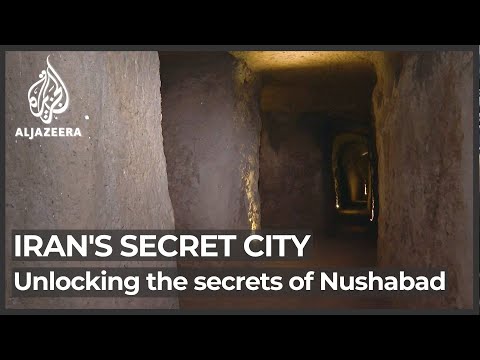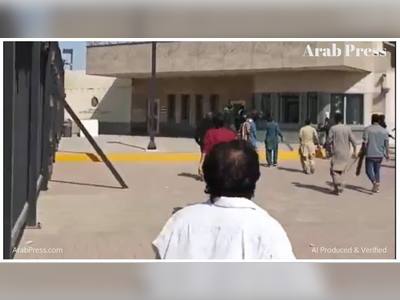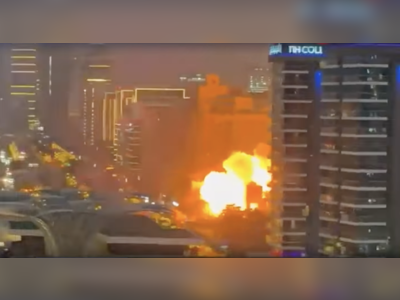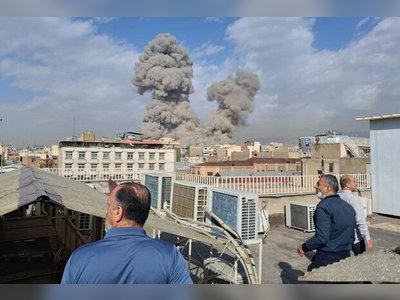
Ukraine war should not hinder Iran deal revival, US analysts say
For months, detractors of the Iran nuclear deal in the United States have warned President Joe Biden against re-entering the agreement. They have now added Russia’s involvement in talks to revive the multilateral pact to their long list of grievances, as Russian forces continue their offensive in Ukraine.
However, supporters of the accord, formally known as the Joint Comprehensive Plan of Action (JCPOA), say the conflict in Ukraine should intensify – not blunt – efforts to restore it.
Negar Mortazavi, an Iranian-American journalist and analyst, said critics of the JCPOA in Washington will always be there, but the Biden administration must be prepared to face opposition if it wants to revive the agreement.
“At the end of the day, it’s like ripping off the band-aid,” Mortazavi told Al Jazeera. “The president just has to make the decision, spend the political capital, take some public heat – which is what Obama did – and just do it.”
European, Iranian and US officials have been saying for weeks that a deal is within sight while also stressing that nothing is agreed until everything is agreed.
According to Mortazavi, the war in Ukraine actually gives Biden more solid footing upon which to restore the nuclear agreement. International sales of Iranian oil, which is currently heavily sanctioned, could help mitigate the global energy crisis created by the war, she said, and the agreement would allow bureaucrats enforcing Iran sanctions to focus on measures against Russia
“For all these reasons, I think sooner is better than later,” Mortazavi said. “But I think the problem with the Biden administration is that they are trying too hard to keep everyone happy … That’s just not possible with Iran.”

US dismisses oil factor
Biden and his top aides have emphasised that they are consulting with US congressional leaders and Middle East allies, many of whom vehemently oppose the JCPOA, on the status of talks to revive the pact.
Opponents of the JCPOA have said it is not adequate, arguing that it merely curbs – without permanently disabling – Iran’s nuclear programme, while failing to address Tehran’s regional policies and ballistic missiles programme.
The deal, which saw Iran scale back its nuclear programme in exchange for a lifting of international sanctions against its economy, faced similar opposition when former President Barack Obama signed it in 2015.
Three years later, former President Donald Trump nixed the deal and launched a “maximum pressure” campaign of sanctions against Iran. In response, Tehran has escalated its nuclear programme well beyond the limits set by the agreement.
But Biden – who said preventing Iran from obtaining a nuclear weapon is one of his top national security priorities – has said he intends to revive the agreement through mutual compliance with the JCPOA.
His administration has made it clear, however, that increasing global oil production is not a consideration in the indirect talks with Iran, several rounds of which have been held in the Austrian capital Vienna since April 2021.
Speaking at the Doha Forum last weekend, the US special envoy for Iran, Robert Malley, said the criteria for reviving the agreement rest strictly on US national security concerns. “The guidance I’ve been given is: ‘Get a deal if our interests are met; get a deal if our concerns are met; get a deal if we could overcome these differences’,” Malley said.
“And there’s been zero sense of ‘Now, you really need to rush for a deal because of the need to get oil on the market.’ I’ve not heard that once.”
Russia’s involvement
The indirect US-Iran negotiations are being conducted with and through other signatories to the 2015 agreement, which include the European Union, Germany and the five permanent members of the UN Security Council – the US, United Kingdom, France, China and Russia.
But Russia’s involvement in the discussions has become the focus of critics of the JCPOA in Washington, especially in light of Russian troops’ invasion of Ukraine.
“Russia has been reduced to a pariah state, and rightly so,” said Democratic Congressman Ritchie Torres, who staunchly supports Israel – a leading critic of the Iran deal and efforts to revive it. “Why, then, are we negotiating with Russia as if it had never invaded Ukraine? As though the times we live in were business as usual?” Torres tweeted in early March.
That opposition was sharpened by reports that Russia was seeking to carve out exemptions from Ukraine-related Western sanctions in its own dealings with Iran.
And while Moscow has said its concerns have been addressed, repeatedly denying reports that it is putting hurdles in the way of restoring the deal, JCPOA critics in Washington continued to invoke Russia’s involvement in the talks to bash the agreement.
“This doesn’t need to be done right now and particularly it doesn’t need to be done when we have the problems going on that we have in Ukraine. We should walk,” Jim Risch, the top Republican on the Senate foreign policy panel, said at a news conference earlier this month.
“Mr President, you’re the only one in America doing business with the Russians, stop doing business with the Russians.”
The final hurdle
Ryan Costello, policy director at the National Iranian American Council (NIAC), a Washington, DC-based group in favour of restoring the deal, dismissed concerns about Russian involvement in the Vienna talks as “silly”.
Costello said the crisis in Ukraine may be sapping diplomatic attention away from the Iran deal at a decisive time in the negotiations, however, which could allow new hurdles to block negotiators from crossing the finish line.
“I do worry that this drift keeps going, and there’s not that high-level attention and focus from the Biden administration basically to resolve it and move on and get the deal and save it,” Costello told Al Jazeera.
The final hurdle in the talks appears to be an Iranian demand to remove the Islamic Revolutionary Guard Corps (IRGC) from the US list of “foreign terrorist organizations” – something Washington has not ruled out but is reluctant to do.
Costello said the IRGC designation is a symbolic issue that is nevertheless important for Iran – and one that could cause a major backlash in Washington for Biden, including from members of his own Democratic Party.
He added that even if the designation is lifted, the IRGC would still face sanctions related to human rights abuses, ballistic missile activities and other issues. “It would be a real shame to come this far and expend this much energy on reconstituting a very good deal just to have it fall apart over this relatively symbolic designation,” Costello said.










